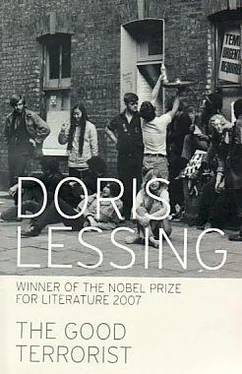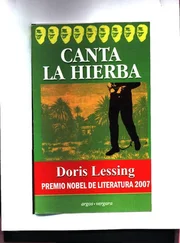She then stood in a doorway, not knowing what to expect, because she had not visualised anything, and saw in the middle of a room a high slanting contraption like a machine with pulleys and levers and wheels and tubes, and on this, half sitting up but collapsed and limp, was Philip, all bandages and wrappings. His face was really all that was visible: dead white, blue veins fluttering on waxen lids, white lips that seemed to have some sort of dried pink dye at the corners. More than ever he seemed like a small elf, an inhuman creature, and Alice, standing there helpless, with the ward sister just behind her, could not move. She was thinking that this is what happened to marginal people, people clinging on but only just. They made one slip; something apparently quite slight happened, like the Greek, but it was part of some downward curve in a life, and that was that - they lost their hold and fell. Philip had lost his hold.
Alice turned such a shocked face on the ward sister that she said, "Are you all right?" Deliberately perfunctory, because she did not want to cope with Alice. "Go and get yourself a cup of tea downstairs," said the sister. "Sit down a bit."
Her look indicated that she was prepared to be concerned about Alice if she produced symptoms that warranted it, but Alice said, "It's all right." She watched the sister go to stand by Philip, looking down carefully at him for about a minute. For some reason this long close look told Alice everything. She turned and ran away down the corridors and stood waiting for the lift, and then went down in the lift, but she did not know she was doing these things. She was whimpering steadily, her eyes fixed in front of her - on Philip's dying face.
And now came the thought: Philip was a long way down on that curve before he asked if he could live with us. What we thought we saw was somebody at the beginning of a curve up, with a new business, everything in front of him, but it wasn't like that at all. Probably it wasn't even the Greek who did him in, made him lose hold - it was when Felicity threw him out. (Alice knew now that this was what had happened, from Felicity's manner.) Perhaps long before that? Suddenly Alice knew. All of it was perfectly clear, like a graph. It was not a question of Philip's having "lost hold." He had never grasped hold. Something had not happened that should have happened: a teacher, or someone, should have said: This one, Philip Fowler, he must be a craftsman, do something small, and delicate and intricate; we must get him trained for that. Look how perfectly he does things! He can't fold a shirt or arrange some chips and a piece of fish on a plate without making a picture of it.
It had not happened. And Philip began to work for a building firm, like everyone who hasn't a training. A painter in a building firm, losing one job after another until he said: I'll start my own business.
The relentlessness of it. The fucking shitty awfulness of it...
She did not afterwards remember how she got back from the hospital. In the kitchen Roberta took one look at her and produced her remedy: brandy was poured into Alice, and Roberta put her arm around her, helped the sodden heavy girl upstairs, got her into her sleeping bag, drew curtains.
Alice slept through the two events of that evening.
The first was that the vicious policeman from the station came in with a policewoman, on some business to do with a stolen car. Jasper and Bert were there, and things didn't go well, would certainly have ended in violence and arrests, only luckily Mary and Reggie appeared, and dealt with the police in their own language, on their own terms. But Mary and Reggie were afterwards cold, were disapproving, saying that there was really no need for trouble with the police if people knew how to handle them. "And, of course, if they behave themselves," was implicit.
They went upstairs, but Reggie came down again almost at once to ask whether in fact Jasper and Bert knew anything about the stolen car?
"We are revolutionaries," said Bert, furious. "Not crooks."
Then, late, after twelve, Felicity came again to say the hospital had telephoned. Philip was dead. She was very upset, so Alice was told next day. She had had to be asked in, fed Alice's soup and Roberta's brandy.
None of this Alice knew till next day. Mid-morning. They were all in the kitchen, the sun coming in, the cat on the window sill.
She said, first, "He went under fast, didn't he?"-mentally seeing a small broken thing, like a bird or an insect, trying to clutch hold of a straw, a twig, and failing. The others did not understand, but Faye, with a cold smile, said, "Lucky Philip." Mary said that Philip had struck her as unstable.
Alice remarked that if the police had got this house in their minds as the place to come and have a bit of fun, then it wouldn't be worth living here. The others of course stared at her, curious: the indifference with which she said it, that was the thing.
Then Alice got up and went upstairs, put Philip's ladder in position, climbed into the attic, and stood under the great rotten beams, keeping the light of the torch on them. She was thinking - or trying to think, to make her mind, or her comprehension, accept it - that Philip had tackled everything else in the house, all the threats and dangers. But this threat, the main one, he had not dealt with, could not. Because - simply - of his size. Because there was nothing to him but a handful of frail bones and a skim of flesh. Alice could see in her mind's eye the sort of man who could have pulled down these two rotten beams, then put in others. A large bale of a man (she could see him), shouldering the beams into place. Effortlessly. Humbled but uncomprehending because of the arbitrariness, the frivolity, of life, she went downstairs again, and remarked that if those beams were not dealt with, the house would start falling in, from the top. She sat in the chair she had been in before going upstairs to the beams, at the side of the table. At head and foot, like mother and father, sat Mary and Reggie. They radiated disapproval. They knew they did, but not that they were full of panic as well.
"The beams are obviously going to have to be put right," said Mary.
Jasper and Bert, Faye and Roberta, who had been observing Alice put things right for weeks, all looked at her, waiting for her to say, perhaps, "It is all right, I have fixed everything." Jocelin and Caroline were uninvolved.
Alice remarked, "Oh, so you have found yourself a flat, then?"
Startled, even affronted, Mary said, "Yes, but how did you...?" And Reggie, "But we haven't told anybody yet; it's not final."
"And so," said Alice, "this house is back on the list, is it?"
"Not for demolition," said Mary. "It was agreed a mistake was made. Both this house and number forty-five will be converted. But, at any rate, nothing will happen immediately. The point is, there will be plenty of time for you to find somewhere else."
"Find another squat," said Reggie kindly.
Again the others looked at Alice, who had put so much into this house, and again seemed surprised that she was unconcerned.
She was examining Mary, examining Reggie, quite frankly, for she needed to know what happened. She could see the two, sitting up side by side in their marriage bed, discussing them all, with identical looks of scandalised criticism. Jim. Faye's suicide attempt. Now Philip. Alice saw that they must have felt trapped among lunatics. Well, never mind, these two good houses were saved, and a lot of people had found shelter for a time.
"Have you got a job?" asked Alice, sure that Reggie had.
Again, annoyance; because, of course, the middle classes did not like to be so transparent.
"As it happens, yes," said Reggie. "It's a new firm, in Guildford. Of course, it'll be a risk, the failure rate with new firms at the moment being what it is. But it's an interesting venture; it may succeed."
Читать дальше











